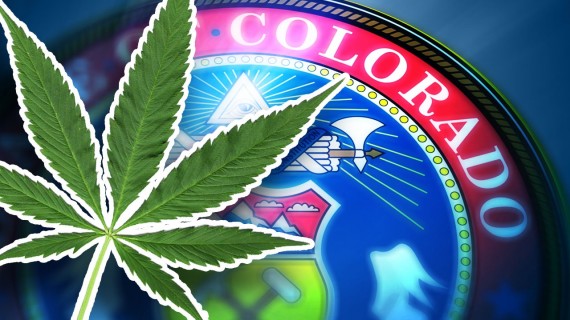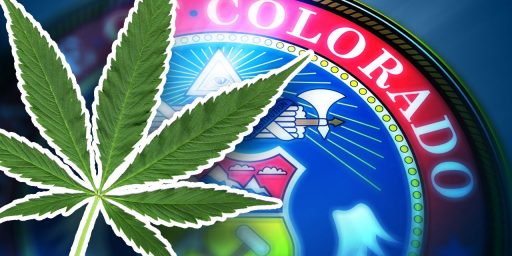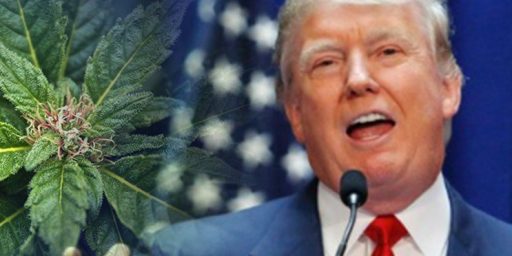Oklahoma And Nebraska Sue Colorado Over Marijuana Legalization
Nebraska and Oklahoma are suing Colorado over the Centennial State's decision to legalize marijuana, but they don't seem to have much of a case.

The states of Nebraska and Oklahoma have filed a lawsuit against Colorado over that state’s law legalizing marijuana, and they are asking the Supreme Court to take immediate jurisdiction of the case
Two heartland states filed the first major court challenge to marijuana legalization on Thursday, saying that Colorado’s growing array of state-regulated recreational marijuana shops was piping marijuana into neighboring states and should be shut down.
The lawsuit was brought by attorneys general in Nebraska and Oklahoma, and asks the United States Supreme Court to strike down key parts of a 2012 voter-approved measure that legalized marijuana in Colorado for adult use and created a new system of stores, taxes and regulations surrounding retail marijuana.
While marijuana remains illegal under federal law, officials have largely allowed Colorado and other states to move ahead with state-run programs allowing medical and recreational marijuana. But the lawsuit from Nebraska and Oklahoma, where marijuana is still outlawed, argues that Colorado has “created a dangerous gap” in the federal drug-control system.
Marijuana flows from this gap into neighboring states,” the suit says, undermining their marijuana bans, “draining their treasuries, and placing stress on their criminal justice systems.”
For months, some sheriffs and police officers in rural counties bordering Colorado have complained that they have seen more marijuana entering their towns and being transported down their highways since recreational sales began in January. Oklahoma and Nebraska said the influx had led to more arrests, more impounded vehicles and higher jail and court costs. They say it has also forced law-enforcement agencies to spend more time and dedicate more resources to handling marijuana-related arrests.
“We’re seeing a lot of marijuana coming over from Colorado,” said Sheriff Adam Hayward of Deuel County, Neb., who said that he was gratified that the two states were challenging Colorado’s marijuana laws. He has complained that marijuana arrests have strained his jail budget. “For the longest time we were saying, this is becoming a problem for us.”
Colorado’s attorney general, John Suthers, a Republican, said in a statement that the challenge from Nebraska and Oklahoma was “without merit.” Like many elected officials in Colorado, Mr. Suthers had opposed Amendment 64, which legalized marijuana. But on Thursday, he said “we will vigorously defend” against the lawsuit attempting to undo it.
Nebraska and Oklahoma’s challenge is aimed more at the commercial side of marijuana legalization, which created new systems of regulations and taxes as well as recreational stores, dispensaries and production facilities that are monitored and licensed by state officials. The suit does not specifically seek to overturn the portion of Amendment 64 that made marijuana legal for personal use and possession, meaning that portions of legalization could survive even if Nebraska and Oklahoma prevail.
But marijuana advocates said that the challenge — if it succeeds at shutting down marijuana retailers — could boost the black market.
“If Nebraska and Oklahoma succeed, they will put the violent criminal organizations back in charge,” Michael Elliott, the executive director of the Marijuana Industry Group, a Colorado-based trade group, said in a statement.
(…)
Nebraska and Oklahoma accused Colorado of leaving huge holes in marijuana rules that allowed the plant to flow out of state.
While it is against the law to take legally purchased marijuana across state lines, Nebraska and Oklahoma said that Colorado does not require consumers to smoke or eat their marijuana where they buy it, and said that despite purchasing and possession limits, anyone can easily visit several dispensaries and stock up. Some sheriffs in bordering states say they have pulled over drivers and found edibles and marijuana from multiple Colorado retail outlets.
As a preliminary matter, it’s worth noting that the case is being brought directly in the Supreme Court because it is one of those rare cases in which the Supreme Court has both original and exclusive jurisdiction, meaning not only that a case can be filed directly with the Justices without having to start out in a U.S. District Court and make its way through the normal appellate process, but that it must do so because no other Court has jurisdiction over the matter. Other cases that fall into this category include cases affecting “Ambassadors, and other public ministers and counsels.” As you might imagine, these cases are exceedingly rare and typically the cases impacting the Court’s original jurisdiction involve issues regarding border disputes between states or states involving disputes about the rights over a particular body of water (which are typically border disputes at heart in any case.) Procedurally, though, the Court requires parties seeking to invoke original jurisdiction to seek Court permission at the start of the case so that the Court can weed out any case in which a case could actually be filed in a different manner in the District Court, meaning that invoking original jurisdiction is not required. In this case, Colorado and Oklahoma are asserting that exercising original jurisdiction is appropriate because the Supreme Court is the only court that can deal with the issues that the Complaint raises. To that end, the two states are essentially making a two-pronged argument regarding the retail establishment provisions of the Colorado law.
First, the two states argue that Colorado’s decision to legalize the sale of marijuana is in and of itself a violation of Federal Laws against the production and sale of marijuana. The problem with this argument is that this seems to be more of a Complaint against the Federal Government than the State of Colorado. When Colorado citizens passed their initiative legalizing marijuana, the Obama Administration announced that it would not seek to block that law from going into effect to the extent that Federal criminal investigations would only concern themselves in the future with issues involving the interstate sale and transportation of marijuana rather than anything that happens exclusively within Colorado’s borders. For example, if it turned out that a retail pot store in Denver was secretly selling and shipping product to Nebraska, or Kansas, or anywhere else in the country, then the Federal Government would step in. Additionally, people who bought marijuana in Colorado and transported it elsewhere, even for their own use, would potentially be subject to Federal prosecution. Transactions that stayed within the borders of Colorado, though, would be left to Colorado authorities. Given the fact that the Tenth Amendment seems to clearly give the states the right to decide what is and is not legal within their borders, and the fact that the Federal Government’s sole authority in this area is based exclusively on the Interstate Commerce Clause, this seems like a reasonable compromise. However, if Nebraska and Oklahoma have a problem with this policy decision by the Federal Government, it strikes me that their complaint lies not with Colorado but with the Justice Department and the argument that the Executive Branch is not properly performing its duties by allowing Colorado to go forward with with this initiative. Admittedly, such a claim would be legally dubious at best for the same reasons the claims that the President’s executive action on immigration are unconstitutional are legally dubious, but I do not see how Colorado is even a proper party to claims that Federal laws are not being enforced inside the borders of Colorado.
The second part of the argument that Oklahoma and Nebraska make in their Complaint, and in support of their argument that the Supreme Court should exercise original jurisdiction essentially revolves around the idea that Colorado’s new law has made things more difficult for its neighboring states when it comes to enforcing their laws, especially in the areas immediately bordering Colorado. The suit alleges, for example, that gaps in the laws governing commercial sales have created loopholes that have made it easier for marijuana purchased legally in Colorado to cross state borders, such as by requiring marijuana that is purchased in a store to be smoked in that location (a requirement that seems ridiculous when you think about it). Both states have also alleged that, since the new laws in Colorado have gone into effect, both states have, as The Denver Post puts it, “the states have suffered increased costs from arrests, the impoundment of vehicles, the seizure of contraband, the transfer of prisoners, and other problems associated with marijuana — which is strictly illegal in the two states — flowing into Nebraska and Oklahoma. The states say the problems amount to “irreparable injury.”” This seems like something of a tenuous argument, especially given the fact that Colorado’s Governor has said on repeated occasions that he is willing to meet with authorities in neighboring states to discuss ways in which Colorado can better accommodate their concerns. In the end, though, absent a law banning sale of marijuana to anyone who is not a Colorado resident, which may not be Constitutional itself, there seems little that can be done practically here. More importantly, though, it strikes me that the argument being made here ignores the fact that it is often the case that states have laws that are different from those of their neighbors and that those differences sometimes have cross-border impact. This is an inevitable outcome of our Federal system and, absent a rule that every state must have the same laws on issues such as this, or gambling, or alcohol and cigarette sales and taxes, there is really nothing that can be done to address the complaint that is being made here. At the very least, given that this is a feature of our Federal system rather than a bug, it is hard to see how it gives rise to a cause of action against a state.
In any case, the Supreme Court will have to determine first of all if the Complaint filed in this case gives rise to sufficient facts to establish the original jurisdiction requested in this case. If it doesn’t then the case is essentially dead, although both Plaintiffs could conceivably seek to refile the cases in District Court in the name of their respective Attorneys General or other non-sovereign parties. If the Court does accept original jurisdiction, then the process is likely to take some time if previous such cases are any indication. Rather than the Court itself actually hearing the case in a full trial where evidence is presented, the typical procedure in these cases is for the matter to be assigned to a Special Master, usually a retired Federal Judge or respected and highly qualified attorney, who will gather the evidence in the case, hear any arguments based on that evidence and ultimately file a report with the Justices with his or her findings and recommendations, which the Justices may accept or reject. This part of the process can often take a year or more and, after it’s over, the Court itself may schedule its own oral argument on the legal issues raised by the case. Therefore, if the Court does accept the case it’s likely to be at least two years or more before we’re even close to a ruling from the Justices on this issue. By then, perhaps, Congress will have passed a law on this matter that resolves the issue of how the Federal Government should treat the increasing number of states where marijuana is legalized or decriminalized.
Here’s the Complaint and other pleadings filed by Oklahoma and Nebraska:





This happens all the time, firearms, alcohol, and fireworks come to mind
So much for states’ rights…
Uhhh….so States’ Rights GOOD for abortion limitations, alcohol, and sex toys, but BAD for marijuana?
(shakes head wildly)
Does not compute.
Yeah, well, this is just, like, their opinions, man.
Interesting that the Obama admin policy on state-legal marijuana seems to undermine the New Deal policy that even production and private consumption on private property impacts interstate commerce.
But this does seem as absurd as New York demanding North Carolina raise its cigarette taxes because the cost of enforcing the NYC ban on “loosies” is raised by the cheaper cigarettes in NC.
Maybe the other 49 states should sue California for the increase costs to their citizens for CA auto emissions requirements or those stupid labels that tell us everything is “known to the State of California to cause cancer”.
And really no reason that Nebraska and Oklahoma couldn’t set up agriculture inspection stations at all border crossings to control the movement of this produce into their territory. If you can search for bad apples, why not marijuana?